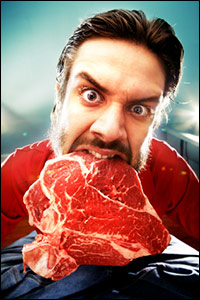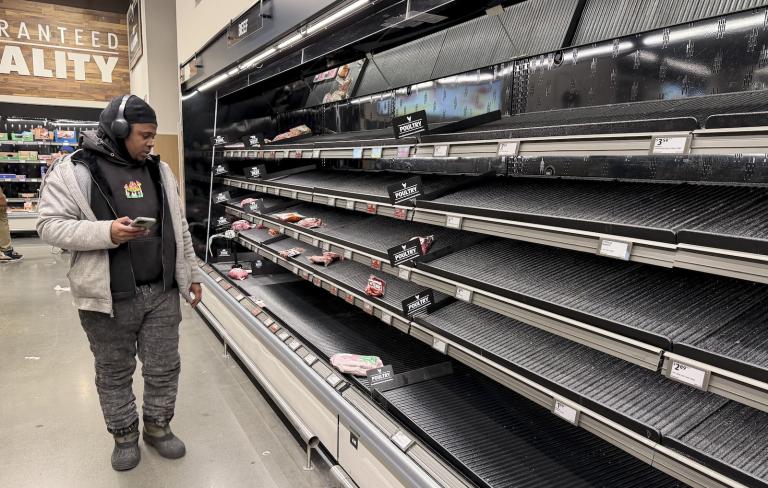Dear Umbra,
I see that PETA’s latest campaign says that meat eating is the No. 1 cause of global warming, not SUVs. This statement may be manipulative and political, but — is it true?
J.
Helena, Mont.
Dearest J.,
I’ll bite.
Shallow digging on one People for the Ethical Treatment of Animals site quickly uncovered their excitement at a 2006 report by the Food and Agriculture Organization of the United Nations, “Livestock’s Long Shadow: Environmental Issues and Options.” Over 300 pages on livestock and the environment. It’s riveting and you too can download and read it.

Apocalypse chow?
Photo: iStockphoto
The authors of the report offer a global perspective on the environmental impacts of the livestock sector. They expect global production of both milk and meat to more than double from 2001 to 2050, and they contextualize this growth as both nutritionally positive for undernourished humans and negative for — can we say overnourished persons, at risk for obesity, heart disease, etc. Humanity gets half its protein intake from livestock products, FYI. Oh, here’s an interesting global comparison: during 2003, people in India ate 5 kg (11 pounds) of meat per person, Americans 123 kg (271 pounds).
The juicy eco-numbers in the report are that, “the livestock sector emerges as one of the top two or three most significant contributors to the most serious environmental problems, at every scale from local to global,” and, “the livestock sector is … responsible for 18 percent of greenhouse-gas emissions measured in CO2 equivalent. This is a higher share than transport.” Thus, the expected doubling of meat and milk production within 50 years clearly presents a challenge.
But as you can see, this is not the same as saying eating meat is the No. 1 contributor to global warming.
I think what you gathered from the PETA campaign is that it was worse to eat a steak than to drive your Excursion to the steakhouse. The FAO report does not address this particular comparison, since it is more focused on global policy changes and industrial practices than on personal shopping choices.
The report does detail the particular impacts animal agriculture has on various environmental categories. Global warming impacts derive from: fossil-fuel use in manufacturing fertilizer and in feed production, on-farm fuel use, forests harvested or burned to make pasture, methane emissions from ruminant digestion and from manure, transportation of products and supplies, and processing. The authors prioritize land use and land degradation as areas for improvement for carbon emissions, through techniques such as agricultural intensification (e.g., intensive rotational grazing), conservation tillage, and erosion reduction. Methane and nitrous oxides, lesser but more powerful greenhouse gases, are a big problem with livestock; here, the authors recommend improving manure management and changing animals’ diets.
How about changing our own diet, with this new piece of global information? That is the basic aim of the campaign by PETA and others, and in theory I support it. I extrapolate that Gristies, who have recreational or employment-based computer access, belong to the group of people who have a choice in the matter. Basically our goals should be the same as always: reduce or eliminate animal products in our diets. Particularly we should look to reduce or eliminate animal foods grown under environmentally disastrous farming techniques.
Two examples of environmentally disastrous techniques include the infamous confinement operations, and massive deforestation for pasture conversion (the Amazon being the poster child here). Those are two simpler systems to track. It’s harder to tell if the farm that raised your anonymous pork is over-applying nitrogen fertilizer. That’s why we like buying locally and/or reading labels such as organic. Of course, not eating meat at all gets you around these issues — and there’s no reason we can’t both eat less livestock and drive fewer miles.
Optimistically,
Umbra


